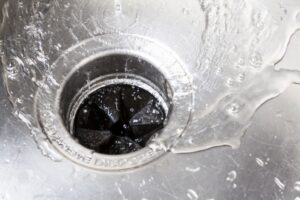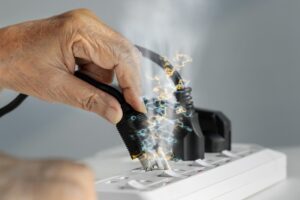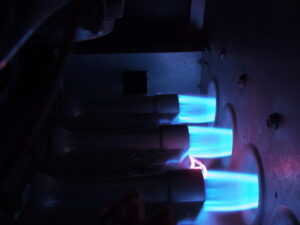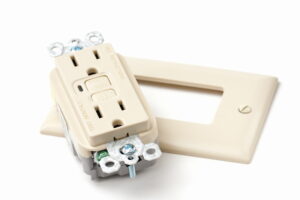 When you have a clog in a sink within your home, your first instinct is very likely to reach for a plunger… or that bottle of store-bought drain cleaning solution you keep on hand.
When you have a clog in a sink within your home, your first instinct is very likely to reach for a plunger… or that bottle of store-bought drain cleaning solution you keep on hand.
A plunger is always a good start. If the clog is superficial enough, you may very well be able to relieve your drain pipe with the plunger and a little bit of “elbow grease. The latter option though—the store-bought drain cleaning solution, is no solution at all.
We’ll dive into the “why” behind this a bit more below, but for now, we’ll just say that store-bought drain cleaners have a lot of caustic chemicals in them, meaning they eat through the clog, then keep on going to eat through the lining of your plumbing pipes over time. Read on as we uncover some more reasons this is no solution.

 The electrical panel of your home, also known as the circuit breaker panel, is tasked with keeping your household’s entire electrical system running as safely and smoothly as possible. Chances are, you don’t think about your electrical panel that much, unless you have a serious electrical problem like a blackout or electrical fire—we sincerely hope this isn’t the case for you.
The electrical panel of your home, also known as the circuit breaker panel, is tasked with keeping your household’s entire electrical system running as safely and smoothly as possible. Chances are, you don’t think about your electrical panel that much, unless you have a serious electrical problem like a blackout or electrical fire—we sincerely hope this isn’t the case for you.
 Our professional plumbers have been in the trade for a long time, and we have seen what can happen when you have the wrong home services “professional” in your home, whether it be for your HVAC, electrical, or plumbing needs.
Our professional plumbers have been in the trade for a long time, and we have seen what can happen when you have the wrong home services “professional” in your home, whether it be for your HVAC, electrical, or plumbing needs. Wintertime temps are still here for a while—in fact if you believe in Groundhog Day predictions, it’s here for about four more weeks, at least! This means your heating system has some time before you shut if off for the season. So if you have repair needs, you should definitely take care of them sooner rather than later.
Wintertime temps are still here for a while—in fact if you believe in Groundhog Day predictions, it’s here for about four more weeks, at least! This means your heating system has some time before you shut if off for the season. So if you have repair needs, you should definitely take care of them sooner rather than later. Plumbing emergencies are inconvenient, to say the least, often unsanitary, and sometimes very damaging to the entire home. Fortunately, we can help with our emergency plumbing services!
Plumbing emergencies are inconvenient, to say the least, often unsanitary, and sometimes very damaging to the entire home. Fortunately, we can help with our emergency plumbing services! Did you know that your electrical outlets protect you? At least, this is definitely the case in modern homes. This is part of the reason it’s so important that if you live in an aging home, you have your electrical system inspected on occasion. Today’s electronics and electrical appliances put increased demand on these systems, which can lead to overloads, blackouts, or even electrical fires.
Did you know that your electrical outlets protect you? At least, this is definitely the case in modern homes. This is part of the reason it’s so important that if you live in an aging home, you have your electrical system inspected on occasion. Today’s electronics and electrical appliances put increased demand on these systems, which can lead to overloads, blackouts, or even electrical fires.
 Winter is right around the corner, and we want to help you be prepared! Hopefully you’ve already taken a step toward winter prep by having your heater tuned-up. If you have a furnace, this means scheduling an annual maintenance session. If you have a year-round heat pump system, this means having maintenance done twice a year.
Winter is right around the corner, and we want to help you be prepared! Hopefully you’ve already taken a step toward winter prep by having your heater tuned-up. If you have a furnace, this means scheduling an annual maintenance session. If you have a year-round heat pump system, this means having maintenance done twice a year. You might be wondering what we mean by this—“My water? What’s wrong with my water?!”
You might be wondering what we mean by this—“My water? What’s wrong with my water?!”